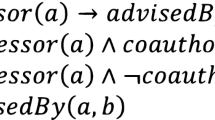Abstract
Abstract. In propositional learning, boosting has been a very popular technique for increasing the accuracy of classification learners. In first-order learning, on the other hand, surprisingly little attention has been paid to boosting, perhaps due to the fact that simple forms of boosting lead to loss of comprehensibility and are too slow when used with standard ILP learners. In this paper, we show how both concerns can be addressed by using a recently proposed technique of constrained confidencerated boosting and a fast weak ILP learner. We give a detailed description of our algorithm and show on two standard benchmark problems that indeed such a weak learner can be boosted to perform comparably to state-of-the-art ILP systems while maintaining acceptable comprehensibility and obtaining short run-times.
Preview
Unable to display preview. Download preview PDF.
Similar content being viewed by others
References
C. Anglano, A. Giordana, G. Lo Bello, and L. Saitta. An experimental evaluation of coevolutive concept learning. In J. Shavlik, editor, Proceedings of the 15th ICML, 1998.
W. Cohen and Y. Singer. A Simple, Fast, and Effective Rule Learner. Proc. of 16th National Conference on Artificial Intelligence, 1999.
A. Karalic. First Order Regression. PhD thesis, University of Ljubljana, Faculty of Computer Science, Ljubljana, Slovenia, 1995.
R.D. King, S. Muggleton, R.A. Lewis, and M.J.E. Sternberg. Drug design by machine learning: The use of inductive logic programming to model the structure activity relationships of trimethoprim analogues binding to dihydrofolate reductase. Proceedings of the National Academy of Sciences of the United States of America 89(23):11322–11326, 1992.
R.D. King, A. Srinivasan, and M. Sternberg. Relating chemical activity to structure: An examination of ILP successes. New Generation Computing, Special issue on Inductive Logic Programming 13(3–4):411–434, 1995.
S. Muggleton. Inverse Entailment and Progol. New Generation Computing, 13:245–286, 1995.
J.R. Quinlan. Bagging, boosting, and C4.5. In Proc. of 14th National Conference on Artificial Intelligence, 1996.
J.R. Quinlan. Boosting First-Order Learning. Algorithmic Learning Theory, 1996.
J.R. Quinlan and R. M. Cameron-Jones. FOIL: A Midterm Report. In P. Brazdil, editor, Proceedings of the 6th European Conference on Machine Learning, volume 667, pages 3–20. Springer-Verlag, 1993.
R.E. Schapire. Theoretical views of boosting and applications. In Proceedings of the 10th International Conference on Algorithmic Learning Theory, 1999.
M. Sebag and C. Rouveirol. Resource-bounded Relational Reasoning: Induction and Deduction through Stochastic Matching. Machine Learning, 38:41–62, 2000.
A. Srinivasan, S. Muggleton, and R. King. Comparing the use of background knowledge by inductive logic programming systems. Proceedings of the 5th International Workshop on Inductive Logic Programming, 1995.
A. Srinivasan, S. Muggleton, M.J.E. Sternberg, and R.D. King. Theories for mutagenicity: A study in first-order and feature-based induction. Artificial Intelligence, 85:277–299, 1996.
S. Wrobel. An algorithm for multi-relational discovery of subgroups. In J. Komrowski and J. Zytkow, editors, Principles of Data Mining and Knowledge Discovery: First European Symposium-Proceedings of the PKDD-97, pages 78–87, 1997.
Author information
Authors and Affiliations
Editor information
Editors and Affiliations
Rights and permissions
Copyright information
© 2001 Springer-Verlag Berlin Heidelberg
About this paper
Cite this paper
Hoche, S., Wrobel, S. (2001). Relational Learning Using Constrained Confidence-Rated Boosting. In: Rouveirol, C., Sebag, M. (eds) Inductive Logic Programming. ILP 2001. Lecture Notes in Computer Science(), vol 2157. Springer, Berlin, Heidelberg. https://doi.org/10.1007/3-540-44797-0_5
Download citation
DOI: https://doi.org/10.1007/3-540-44797-0_5
Published:
Publisher Name: Springer, Berlin, Heidelberg
Print ISBN: 978-3-540-42538-0
Online ISBN: 978-3-540-44797-9
eBook Packages: Springer Book Archive




